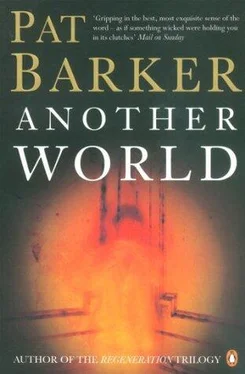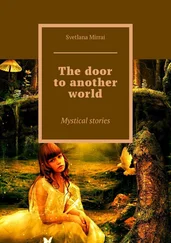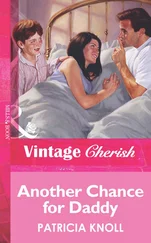Another childhood memory of bad weather. Grandad saying, ‘Pity poor Mary on the wild moor on a night like this.’ The words are as evocative as those lakes of orange tea ruffled by his breath.
‘Do you want to go upstairs now?’
‘Not yet. Why don’t we have a proper fire?’
Because, Nick thinks, the rooks probably nested in the chimney last spring and we’ll set the whole bloody row on fire. He brings in newspapers, coal and sticks, rakes out a whole summer’s worth of fag ends, ash and bits of paper, then, criss-crossing sticks with nuggets of coal on a bed of scrunched-up paper, begins to build the fire. Geordie watches, taking pleasure in the exercise of a simple skill. Nick applies a match to the fans of paper, but the coal’s wet, the fire spits sullenly and burns dead. He holds a sheet of newspaper across the fireplace, feeling it sucked in at once by the fierce draught. Rapidly the paper grows yellow, hot and thin. A picture of ruined Sarajevo blackens and begins to burn. Only just in time Nick whips away the page in a gust of sparks and acrid smoke.
When he looks back into the room, Grandad’s awake. The firelight, seeking out the hollows of the eye sockets, seems to strip flesh from bone. He’s looking at a skull.
‘Do you want a pain-killer?’
‘Aye, go on, I think I’d better.’
Nick watches the swallowing of water, the cautious placing of the pills on the back of the tongue. It takes three swallows each to get them down, the back of his throat’s so dry. ‘Do you want some artificial spit?’ He sprays artificial spit, as they both call it, round Grandad’s mouth. The stuff smells awful and tastes worse, but there’s no doubt it adds to Grandad’s comfort. He settles back against the sofa cushions and stares into the fire. Nick thinks he might read for a while, though in fact he stares at the newspaper without even trying to read it, since he knows from experience he’ll retain nothing. Extreme tiredness seems to demolish concentration, almost like shock or grief or the after-effects of anaesthesia. He can’t even locate himself in the week, has to look at the top of the paper to find out what day it is. At last he lets it slip, sighing, to the floor.
Geordie’s eyelids are drooping, the pain-killers beginning to work. ‘Come on,’ Nick says, tossing his cigarette on to the fire. ‘Let’s get you up to bed.’
He carries Geordie upstairs, and undresses him. Stone cold, Nick thinks, feeling his legs, though the fire downstairs was blazing hot. ‘Do you want a bottle?’
No answer. His eyes are closed. Nick fetches his pyjamas, puts them on and slides in beside Geordie. If he can offer nothing else he can offer the warmth of his body. He lies tensely aware of Geordie beside him, reluctant to turn and look at him, willing him to go to sleep. After a few minutes Geordie’s breathing becomes deeper, and Nick risks a sideways glance.
At first sight he seems to be asleep; his eyes are slivers of white and his mouth’s open, but then, as Nick watches, the tip of the tongue comes out and works its way round his lips to moisten them, and the eyes flicker. He says, and the words cling to his dry mouth, ‘I am in hell.’
Nick turns on to his back, and stares into the darkness for what seems to him a long time, until sheer exhaustion presses his face down into smothering folds of sleep.
Waking early the following morning, stiff and cramped, Nick finds Geordie not merely asleep, but probably, he thinks, unconscious. His breathing’s laboured, his skin looks flushed, but feels clammy, and even a shake of the arm fails to rouse him.
Nick runs downstairs, phones Frieda and Fran, tries again and again to reach the doctor. When he finally gets through and books a visit he wonders why he’s bothering, what he expects the doctor to do that hasn’t already been done. Frieda arrives, panting for breath, goes upstairs by herself and comes down again, red-eyed. They stand in the kitchen together, drinking tea, talking about funeral arrangements, half ashamed, wondering whether there isn’t something indecent about doing this while Geordie’s still alive. St John’s, they decide on. Frieda’s mother’s buried there, and there’s room in the grave, though Frieda can’t for the life of her remember where she’s put the deeds.
The day drags past from breath to breath, each seeming for one shuddering moment to be the last. When Nick takes Geordie’s hand there’s an unexpectedly strong answering grip. Geordie seems to be trying to pull himself into an upright position. He says, Pull, pull, but it hardly seems fair hauling him into an upright position, when there’s nothing to be gained. But ignoring the plea’s horrible. Geordie’s totally helpless now and yet Nick’s not doing the one thing he’s asked to do.
From time to time Frieda puts a feeding beaker to his lips, and he drinks eagerly, his mouth puckering round the spout like a baby’s on the nipple. When he’s finished there’s a smear of milk on his chin that Nick wipes away. Then for hours — nothing. Asleep, drugged, unconscious, it’s hard to tell — his breath hardly raises the counterpane, and his eyes are closed.
The doctor comes, hooks up the eyelids between thumb and forefinger, shines a torch. A stroke, he says, and for one insane — no, not insane, entirely sane — moment Nick wants to laugh. Bayonet wound, cancer, doesn’t matter now. Geordie’s sidestepped them both. After the doctor’s gone, Nick, remembering something he’s heard or read, puts his fingers to Geordie’s pulse, and there it is: beat, echo, beat, echo. His breathing’s changed too, though Nick would find it difficult to describe the change.
They sit with him, one on either side of the bed, not saying much. At last, just after ten o’clock, Geordie draws a particularly raucous breath, holds it, lets it out slowly. Nick and Frieda look at each other, she leans forward, half in the expectation of relief. Then another breath, and she sits back. They glance at each other and then quickly away, each dreading to see the other’s disappointment. Another breath, another pause. They wait. A shudder passes through Geordie’s thin chest, a lifting of the ribs. A clock ticks in the silence. No breath and still no breath. Tick. Tick. No breath. ‘He’s gone,’ Frieda says, and, though they’ve expected this moment for weeks, the words are amazing.
Downstairs, Nick makes a cup of tea, pours a slug of brandy into Frieda’s, and persuades her to drink it.
‘I can’t believe he’s gone,’ she says, cradling the cup in her hands. ‘It’s like the side of the house going.’
‘What do we have to do?’ Nick asks.
‘Nothing, I don’t think. Nothing we can do now till morning.’
‘I’d like to tidy him up a bit.’
‘I can do that.’
‘No, let’s do it together.’
They get a bowl of water, towels and soap, and go upstairs.
‘He was shaved yesterday. I don’t think we need to do that,’ Nick says.
‘No, the undertaker’ll do that. Just straighten him out.’
Nick pulls the sheets down, and Frieda looks away while he does what has to be done.
‘You’d better put a towel,’ she says. ‘Sometimes, they… You know.’
Nick pushes a clean white towel between Geordie’s legs. He feels self-conscious, handling the penis and scrotum as he cleans him up, wondering why he’s bothering since Geordie can’t be aware of, or care, who does these essential last jobs. But it’s right they should be done by somebody who knew and loved him. Right too that they should be difficult to do. Even in death the genitals are a source of power. Frieda’s averted face and his own shyness have a truth to them that trivialized the easy acceptance of nudity. He dries the still warm skin, fastens the pyjama jacket, and draws the sheet up to his chin. The eyes have opened slightly, and he presses them closed. ‘Do we put his teeth in, do you think?’
Читать дальше












